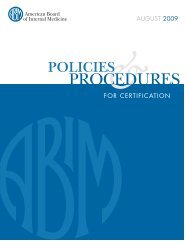The SRA Symposium - College of Medicine
The SRA Symposium - College of Medicine
The SRA Symposium - College of Medicine
Create successful ePaper yourself
Turn your PDF publications into a flip-book with our unique Google optimized e-Paper software.
Papers<br />
can be counted (syllables, words, sentences), they cannot take into account other more important<br />
factors that are usually described as document design and layout.<br />
One way to approach patient understanding <strong>of</strong> consent forms is to comprehension skills needed<br />
to understand science materials (Chall, Bissex, Conard, et al 1996). While their analysis dealt with<br />
qualitative assessments <strong>of</strong> text difficulty in the sciences, their conclusions are relevant to science<br />
based consent forms in clinical trials. For patients to understand consent forms, they must possess<br />
cognitive abilities not measured by readability formulas, such as: 1) large vocabulary, so they can<br />
understanding uncommon words used in abstract and theoretical discussions, 2) sentence structure<br />
familiarity—understanding long and complicated sentences, <strong>of</strong>ten with embedded phrases,<br />
3)extensive prior knowledge—analyzing and synthesizing abstract, theoretical, and technical<br />
information, as well as hypothesis testing and applied science principles.<br />
Subject testing: <strong>The</strong> real measure <strong>of</strong> comprehension is not the grade level score <strong>of</strong> a readability formula,<br />
but how well prospective subjects actually understand the consent process. Wendler (2004)<br />
suggests using postdecision questionnaires (PDQs)to formally assess every subject’s consent not<br />
just cognitively impaired subjects. However, that approach requires some agreement by informed<br />
consent researchers on the definition and measurement <strong>of</strong> informed consent “understanding,” as<br />
well as collaborative development <strong>of</strong> PDQs that are psychologically valid and reliable, not based on<br />
rote memory, or comprised <strong>of</strong> true-false questions (subjects can get 50% correct by guessing). If<br />
done appropriately, PDQs could eliminate some readability compliance flaws and legally be a more<br />
defensible approach to consent form understanding.<br />
Conclusion:<br />
Consent form noncompliance is risky. <strong>The</strong>re are legal risks in which subjects may sue, perhaps in<br />
class action lawsuits, if they believe they experienced dignitary harm because they didn’t understand<br />
the consent form. <strong>The</strong>re are the financial risks for institutions defending themselves against<br />
such lawsuits, and the potential for large financial settlements, either in out-<strong>of</strong>-court settlements<br />
or in a jury’s recommendations. <strong>The</strong>re are the ethical implications that influence public perceptions<br />
<strong>of</strong> the researchers and the institution that’s being sued, and there are research risks associated<br />
with recruiting future research subjects.<br />
<strong>The</strong> inconsistencies found in readability formulas and the research that’s based on such formulas<br />
can be viewed as academic arguments to be discussed by researchers at pr<strong>of</strong>essional conferences<br />
and in academic journals. But, readability isn’t just about research, it’s about compliance with federal,<br />
institutional, and IRB recommendations. Federal regulatory agencies, research administrators<br />
and IRBs should assess the variety <strong>of</strong> risks associated with consent forms written at grade leaves<br />
much higher than recommended. If readability compliance is as impossible and inappropriate<br />
as it seems to be, why repeat recommendations that consent forms be written at a 6th-8th grade<br />
reading level if it’s not only impossible to meet that goal, but has the potential to put organizations,<br />
IRBs, and researchers at risk? When it comes to readability <strong>of</strong> consent forms, be careful what you<br />
ask for; you might not get it.<br />
2005 <strong>Symposium</strong> Proceedings Book 121

















